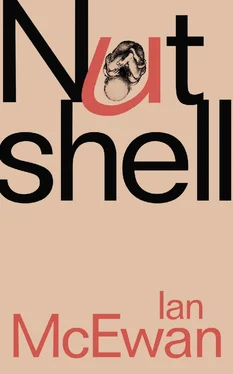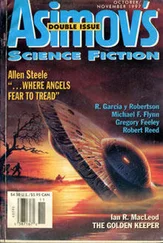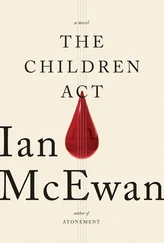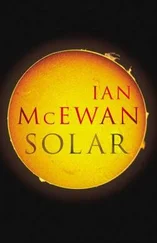Ian McEwan - Nutshell
Здесь есть возможность читать онлайн «Ian McEwan - Nutshell» весь текст электронной книги совершенно бесплатно (целиком полную версию без сокращений). В некоторых случаях можно слушать аудио, скачать через торрент в формате fb2 и присутствует краткое содержание. Год выпуска: 2016, Издательство: Jonathan Cape, Жанр: Современная проза, на английском языке. Описание произведения, (предисловие) а так же отзывы посетителей доступны на портале библиотеки ЛибКат.
- Название:Nutshell
- Автор:
- Издательство:Jonathan Cape
- Жанр:
- Год:2016
- ISBN:нет данных
- Рейтинг книги:3 / 5. Голосов: 1
-
Избранное:Добавить в избранное
- Отзывы:
-
Ваша оценка:
- 60
- 1
- 2
- 3
- 4
- 5
Nutshell: краткое содержание, описание и аннотация
Предлагаем к чтению аннотацию, описание, краткое содержание или предисловие (зависит от того, что написал сам автор книги «Nutshell»). Если вы не нашли необходимую информацию о книге — напишите в комментариях, мы постараемся отыскать её.
Told from a perspective unlike any other,
is a classic tale of murder and deceit from one of the world’s master storytellers.
Nutshell — читать онлайн бесплатно полную книгу (весь текст) целиком
Ниже представлен текст книги, разбитый по страницам. Система сохранения места последней прочитанной страницы, позволяет с удобством читать онлайн бесплатно книгу «Nutshell», без необходимости каждый раз заново искать на чём Вы остановились. Поставьте закладку, и сможете в любой момент перейти на страницу, на которой закончили чтение.
Интервал:
Закладка:
On and on through the afternoon, and it’s on this long flat stretch of time that I have my first dream, in full colour and rich visual depth. The line, the stated border, between dreaming and waking is vague. No fences or fire break in the trees. Only vacant sentry huts mark the crossing. I begin indistinctly in this new land, as a tyro must, with a formless mass or mess of wavering, ill-lit shapes, people and places dissolving, indistinct voices in vaulted spaces singing or speaking. As I pass through, I feel the pain of unnamed, unreachable remorse, a sense of having left someone or something behind in a betrayal of duty or love. Then it comes beautifully clear. A cold mist on the day of my desertion, a three-day journey on horseback, long rows of the sullen English poor in the rutted lanes, giant elms looming over flooded meadows by the Thames, and at last the familiar thrill and din of the city. In the streets the odour of human waste as solid as house walls, yielding around a narrow corner to the aroma of roasted meat and rosemary and a drab entranceway I pass through to see a young man of my age in the dark-beamed gloom at a table pouring wine from an earthenware jug, a handsome man, leaning in across a smeared oak table, holding me with a tale he has in mind, something he has written or I have, and wants an opinion, or to give one, a correction, a point of fact. Or he wants me to tell him how to go on. This blurring of identity is one aspect of the love I feel for him, which almost smothers the guilt I want to leave behind. Outside in the street a bell tolls. We crowd outside to wait for the funeral cortège. We know this is an important death. The procession doesn’t appear, but the bell keeps ringing.
* * *
It’s my mother who hears the doorbell. Before I’ve drifted upwards from the novelty of dream-logic, she’s in her dressing gown and we’re descending the stairs. As we reach the last run, she gives a cry of surprise. I would guess the midden has been cleared while we slept. The bell sounds again, loud, hard, angry. Trudy is opening the door as she shouts, ‘For God’s sake! Are you drunk? I’m going as fast as—’
She falters. If she has faith in herself she shouldn’t be astonished to see what dread has already let me see: a policeman, no, two, removing their hats.
A kind, fatherly voice says, ‘Are you Mrs Cairncross, wife of John?’
She nods.
‘Sergeant Crowley. I’m afraid we have some very bad news. May we come in?’
‘Oh God,’ my mother remembers to say.
They follow us into the sitting room, rarely used and almost clean. If the hallway hadn’t been cleared, I think my mother would have been an immediate suspect. Police work is intuitive. What remains, possibly, is a lingering smell, easily confused with exotic cooking.
A second voice, younger, with brotherly solicitude, says, ‘We’d like you to be sitting down.’
The sergeant breaks the news. Mr Cairncross’s car was reported on the hard shoulder of the M1 north-bound, twenty miles from London. His door was open, and not far off, on a grassy embankment, he lay face down. An ambulance came, resuscitation was attempted during the race to hospital, but he died along the way.
A sob, like an air bubble in deep water, rises through my mother’s body, rises through me, to burst into the faces of the attentive police.
‘Oh God!’ she shouts. ‘We had the most awful row this morning.’ She hunches forward. I feel her put her hands to her face and start to shiver.
‘I should tell you this,’ the same policeman continues. He pauses delicately, mindful of the double respect owed to the heavily pregnant bereaved. ‘We tried to contact you this afternoon. A friend of his identified the body. I’m afraid our first impression is suicide.’
When my mother straightens her spine and lets out a cry, I’m overcome by love for her, for all that’s lost — Dubrovnik, poetry, daily life. She loved him once, as he her. Summoning this fact, erasing others, lifts her performance.
‘I should have … I should have kept him here. Oh my God, it’s all my fault.’
How clever, hiding in plain sight, behind the truth.
The sergeant says, ‘People often say that. But you mustn’t, you shouldn’t. It’s wrong to go blaming yourself.’
A deep inhalation and sigh. She seems about to speak, stops, sighs again, gathers herself. ‘I ought to explain. Things weren’t going well between us. He was seeing someone, he moved out. And I started a … His brother moved in with me. John took it badly. That’s why I’m saying …’
She’s got in first with Claude, told them what they were bound to discover. If, in flagrant mood, she were to say now, ‘I killed him,’ she’d be safe.
I hear the rasp of Velcro, the flip of notebook page, the scratch of pencil. She tells them in dulled voice all that she’d rehearsed, returning at the end to her own culpability. She should never have let him drive away in such a state.
The younger man says reverentially, ‘Mrs Cairncross. You weren’t to know.’
Then she changes tack, almost sounds cross. ‘I don’t think I’m taking this in. I’m not even sure I believe you.’
‘That’s understandable.’ This is the paternal sergeant. With polite coughs, he and his colleague stand, ready to leave. ‘Is there someone you can call? Someone who can be with you?’
My mother considers her reply. She’s bent over again, face in hands. She speaks through her fingers in a flat voice. ‘My brother-in-law’s here now. He’s upstairs asleep.’
The guardians of the rule of law might be exchanging a lewd glance. Any token of their scepticism would help me.
‘When the time’s right we’d like a word with him as well,’ the younger one says.
‘This news is going to kill him.’
‘I expect you’d like to be alone together now.’
There it is again, the slender lifeline of insinuation to support my cowardly hope that the Force — Leviathan, not I — will take revenge.
I need a moment alone, beyond the reach of voices. I’ve been too absorbed, too impressed by Trudy’s art to peer into the pit of my own grief. And beyond it, the mystery of how love for my mother swells in proportion to my hatred. She’s made herself my only parent. I won’t survive without her, without the enveloping green gaze to smile into, the loving voice pouring sweets in my ear, the cool hands tending my private parts.
The constabulary leave. My mother mounts the stairs with a plodding tread. Hand firmly on the banister. One-two and pause, one-two and pause. She’s making a repeated humming sound on a fading note, a moan of pity or sadness exhaled through her nostrils. Nnng … nnng . I know her. Something’s building, a prelude to a reckoning. She devised a plot, pure artifice, a malign fairy tale. Now her fanciful story is deserting her, crossing the border as I did this afternoon, but in reverse, past the watchless guard huts, to rise against her, and side with the socially real, the dull quotidian of the working-day world, of human contacts, appointments, obligations, video cameras, computers with inhuman memories. In short, consequences. The tale has turned tail.
Hammered by drink and lost sleep, bearing me upwards, she continues towards the bedroom. It was never meant to work , she’s telling herself. It was just my foolish spite. I’m only guilty of a mistake.
The next step is close, but she won’t take it yet.
TWELVE
WE ARE ADVANCING on slumbering Claude, a hump, a bell-curve of sound baffled by bedclothes. On the exhalation, a long, constipated groan, its approaching terminus frilled with electric sibilants. Then an extended pause which, if you loved him, might alarm you. Has he breathed his last? If you don’t, there’s hope he has. But finally, a shorter, greedy intake, scarred with the rattle of wind-dried mucus and, at the breezy summit, the soft palate’s triumphant purr. The rising volume announces we are very close. Trudy says his name. I feel her hand extend towards him while he’s on a downward plunge through the sibilants. She’s impatient, she needs to share their success and her touch on his shoulder isn’t gentle. He coughs into half-life, like his brother’s car, and takes some seconds to find the words to pose his question.
Читать дальшеИнтервал:
Закладка:
Похожие книги на «Nutshell»
Представляем Вашему вниманию похожие книги на «Nutshell» списком для выбора. Мы отобрали схожую по названию и смыслу литературу в надежде предоставить читателям больше вариантов отыскать новые, интересные, ещё непрочитанные произведения.
Обсуждение, отзывы о книге «Nutshell» и просто собственные мнения читателей. Оставьте ваши комментарии, напишите, что Вы думаете о произведении, его смысле или главных героях. Укажите что конкретно понравилось, а что нет, и почему Вы так считаете.












